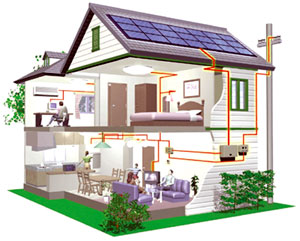 |
Solar power comes in two types: passive solar heating for water and electricity generation through photo-voltaic panels. Solar panels used to be expensive, but the prices have come crashing down after China became the world's largest producer of photovoltaics.
Soaring fuel costs, the inavailability of diesel, and unreliable inverters have encouraged Nepalis to install solar cells for electricity generation. Banks like Laxmi Bank and Clean Energy Development Bank now provide low interest loans for solar systems increasing the number of consumers who are willing to bear the one-time installation cost.
Raj Thapa of Solar Solutions says: "The potential of solar energy has come out of necessity, not necessarily because people want to have a green lifestyle."
Earlier, the demand for solar panels was higher in rural Nepal. But with power cuts crippling the urban sector, demand has soared in the cities. "Cost of solar panels will keep coming down, while hydropower generation isunlikely to keep up with demand for the foreseeable future," says Manish Bajracharya of Lotus Energy. In the past 20 years, Lotus has pioneered basic solar lighting for rural Nepal, and is now struggling to meet the demand of urban customers.
Companies are now providing customised solar packages according to energy requirements of households or offices. These packages range from systems that can run two light bulbs to those that can operate heavier appliances like water pumps and refrigerators.
It's possible to have a fully solar-dependent power system, though most Nepalis opt for a more economical hybrid system. A hybrid system allows a battery to charge through solar power as well as the main power line, ensuring 24-hour power supply even on overcast days.
It is possible for individual households to sell surplus electricity to the national grid like in Germany, but NEA has no provision for household electric meters that run backwards. "If the policy was in place, every house could potentially be a generator of electricity from its rooftop panels," says Yug Tamrakar of Solar Electricity.
Ultra Group is another company that has rushed to meet customer demand for clean, silent, and convenient solar power this winter. "Power cuts have focused people's attention on solar energy as a convenient alternative", says K.R. Khanal of Ultra Group. "It has pushed the use of eco-friendly, efficient and renewable energy systems."
See also:
The sun is free for everyone but not for Nepalis, it seems, ADAM FRIEDSOHN
Bring home the sunshine, PAAVAN MATHEMA
Have the sun back you up this loadshedding season, and for years to come
The age of enlightenment, AHMAD ISKANDAR
The prospect of at least six more years of power cuts is making businesses, homes and offices to migrate to solar power in a big way
Rabi rocks! (The sun god, that is), RABI THAPA
It's easy to be blas�, but solar energy really is magic of the highest order
Sunny life
Aastha Pant of Gairidhara was initially hesitant to invest in solar panels. But after a year of use, she is pleased with her decision. She doesn't need to buy diesel, there is no noisy generator in the balcony, no fumes and the she doesn't even know when the lights have come or gone.
"Last year I upgraded the basic lighting system of my house into solar power and the result has been great," says Aastha who is now planning to hook up more appliances and lights to the battery system charged by solar energy.
Nepal first
While the whole country is trying to cope the best it can to power cuts, Dhaubadi village in Nawalparasi district has become Asia's first renewable energy village with the installation of a wind-solar hybrid power system.
Two sets of 5 kw wind turbines along with 2 kwp of solar PV panels have been set up and the system is capable of generating 43.6 kwh electricity per day, which can light 46 households in the village. The installation of this facility is expected to increase productivity in the village where all work used to come to a complete halt after dark.
Financial and technical support for the system was provided by the Asian Development Bank (ADB). Nepal is now the first country to benefit from the ADB's clean and renewable energy project and bank says it selected Nepal as the pilot country mainly because of the country's chronic energy shortage. ADB's local partner is the Alternative Energy Promotion Centre of the Ministry of Environment.
In the next phase of the project, greenhouses will be set up to manage water use for high-value cash crops and vegetable production. Through this the ADB and Nepal government hope to increase income generating activities in the village community.
Read also:
Life in the sunshine, BHRIKUTI RAI
Solar energy promises to take Nepalis out of the dark ages
The world's 'Solar King' ,
RIC WASSERMAN in STOCKHOLM
China's Huang Ming wins this year's 'alternative Nobel' for being a solar energy pioneer


